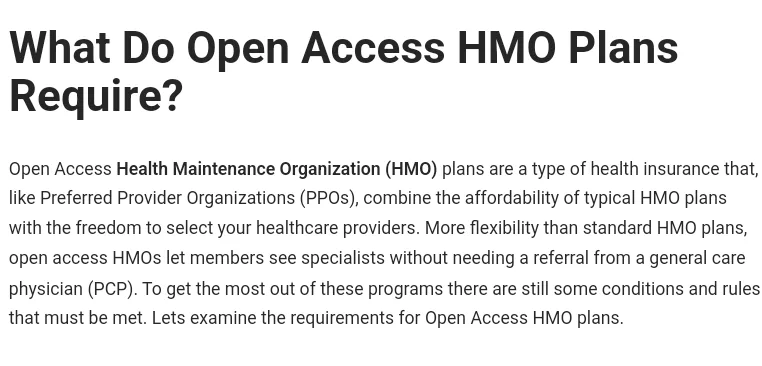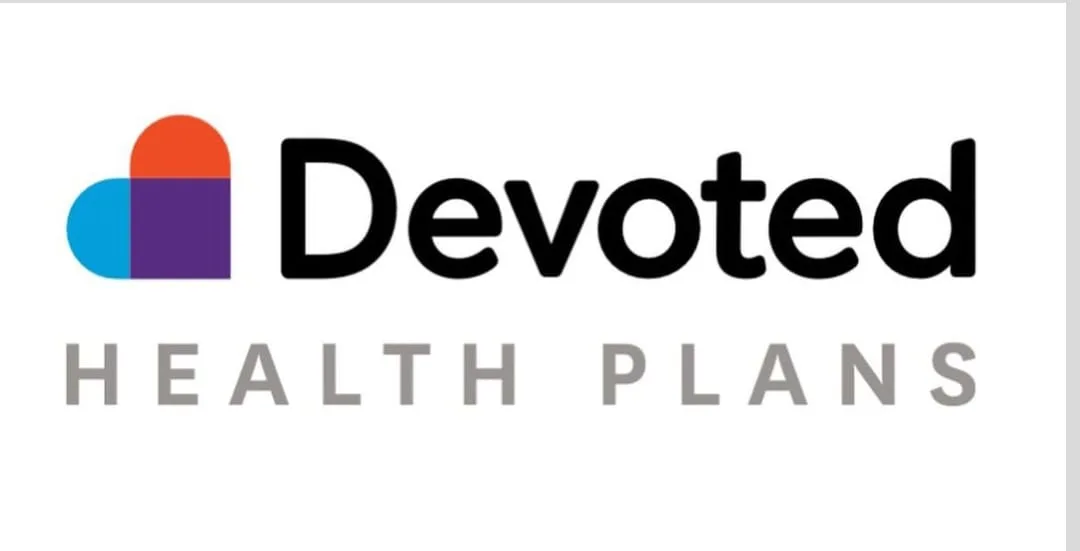
Open Access Health Maintenance Organization (HMO) plans are a type of health insurance that, like Preferred Provider Organizations (PPOs), combine the affordability of typical HMO plans with the freedom to select your healthcare providers. More flexibility than standard HMO plans, open access HMOs let members see specialists without needing a referral from a general care physician (PCP). To get the most out of these programs there are still some conditions and rules that must be met. Lets examine the requirements for Open Access HMO plans.
1. Selecting a Primary Care Physician (PCP)
Members of an Open Access HMO still have to choose a Primary Care Physician (PCP) from the network of approved providers despite the fact that this type of plan gives greater flexibility. For the majority of your healthcare needs including routine exams, preventive care and managing long term diseases your PCP serves as your primary point of contact.
Why it is important :
- Your PCP assists in arranging for your medical treatments and guarantees continuity of care.
- Though you usually won’t need a referral your PCP can nonetheless suggest experts if necessary.
2. Using In-Network Providers
Open Access HMO plans continue to function through a network of medical professionals. You must only use in-network physicians, hospitals and facilities in order to control expenses, even though you have greater freedom to see specialists. Depending on the plan, using out-of-network providers may not be covered at all or will often result in greater out-of-pocket expenses.
What is this mean :
- To prevent unanticipated costs be sure that any medical treatment you use, whether specialist or not, is covered by the plan.
- A tiered network, wherein certain in-network providers charge less than others, may be present in some Open Access HMO plans.
3. No Referral Needed for Specialists
You can consult a specialist without your PCPs referral which is one of the main benefits of an Open Access HMO plan. Compared to standard HMOs where you usually need your PCP’s clearance before seeing a specialist or receiving specialized treatment, this is a change.
Why this is benefits to you :
- Spending less time waiting for a referral allows you to see an expert straight away.
- This offers you greater autonomy over the healthcare choices you make, particularly with regard to chronic or particular medical issues requiring specialized care.
4. Preventive Care and Wellness Requirements
Open Access HMO plans usually place a strong emphasis on preventative care offering little or no cost to members for items including annual exams, screenings and immunizations. Members are advised to use these preventative treatments in order to minimize healthcare expenditures and guarantee positive health outcomes.
Commonly covered preventive services consist of:
- routine medical examinations.
- diabetes, cholesterol and blood pressure checks.
- vaccinations (e.g., tetanus, flu vaccines, etc.).
- screenings for cancer (such as mammograms and colonoscopies).
What this implies for you
- For preventative care, you are advised to make routine appointments with your PCP.
- Being proactive with your health is beneficial because using in-network physicians frequently covers 100% of preventive treatment.

5. Preauthorization for Certain Services
Some medical services still need preauthorization, even with Open Access HMO plans offering greater flexibility in terms of accessing specialists. It follows that before to receiving some services, treatments or operations, you or your physician must obtain insurance company clearance.
Preauthorization is often required for the following common services :
- or intricate medical procedures such as surgeries.
- Some diagnostic tests (CT and MRI scans, for example).
- stays in hospitals as inpatients.
- sturdy medical gear, such as prosthetic limbs and wheelchairs.
Reasons for needing this:
- When a service is preauthorized, it guarantees that it is both medically required and fits the requirements of the plan.
- Because it avoids needless or excessively costly procedures, it lowers healthcare expenses.
6. Co-Pays, Deductibles and Coinsurance
Generally speaking, Open Access HMO plans have less expensive premiums than PPOs, but you will still be responsible for paying certain co-pays, deductibles and coinsurance.
Co-pays : Set fees you must pay for specific services, including prescription drugs or medical appointments.
Deductibles : The amount you have to pay out-of-pocket before specific procedures are covered by the insurer.
Coinsurance is the portion of the service charge that remains your responsibility even after your deductible has been paid.
Recognizing cost-sharing
- Make sure you comprehend the deductibles and co-pays associated with the various service categories covered by your plan.
- Whether you see a specialist, PCP or are receiving inpatient care can all affect these expenditures.
7. Prescription Drug Coverage
Prescription drug coverage is typically included in Open Access HMO plans just like it is in other HMO plans. Typically these plans include a formulary a list of approved drugs that is categorized into several price ranges.
Points to remember :
- Compared to brand-name or specialty prescriptions which may have higher co-pays or coinsurance, generic drugs are frequently the most cheap alternative.
- To find out if your prescriptions are covered by your plan and how much you will have to pay out of pocket check the formulary.
8. Out-of-Network and Emergency Coverage
For the most part, you must use in-network doctors however, emergency care from an out-of-network provider is typically covered by Open Access HMO plans instead. When there is an emergency, you can go to the closest hospital for care without worrying about network limitations.
Important information to remember :
- Regardless of the location, emergency services are typically covered.
- It is critical to avoid going outside of the network whenever feasible because non-emergency out-of-network care may result in increased expenses or no coverage at all.
In the End
Plans offered by Open Access HMOs blend affordability and flexibility. They let you see specialists without a recommendation but for the majority of treatments you still have to select a PCP and remain with in network providers. Making the most of your health insurance and avoiding unforeseen costs can be achieved by being aware of the essential requirements of an Open Access HMO pla which include network limitations preauthorization for specific treatments and coverage for preventative care.
You may maintain the effectiveness and affordability of your healthcare while taking advantage of the advantages of an Open Access HMO plan by adhering to these rules.
You may also like to read this: What is Evidence-Based Practice (EBP) in Nursing? 3 Pillars and Implementation
For fitness blogs click here.
Frequently Asked Questions (FAQs)
Is Aetna Select Open Access a PPO or HMO?
Aetna Select Open Access is really more of a PPO than an HMO. You can choose a greater number of physicians for your health care, and you will not need to obtain a referral from your primary care physician for the services of any specialist you want to receive. However, you are free to see any provider you desire, but you will typically spend less money if you remain within a network of preferred providers. This is not, however, true of HMO plans, which usually have requirements of referral and much stricter restrictions on their provider choices.
What type of plan is Aetna Managed Choice Open Access?
Managed Choice Open Access is a type of hybrid plan combining elements of the PPO and HMO. You can see any specialist you want, without obtaining a referral, as in a PPO. At the same time, it emphasizes managing care and costs with a network of preferred providers as in an HMO. One’s money is normally saved when he stays within the network although he is allowed to go out of the network for care at a higher cost. It really serves a balance between flexibility and cost control by offering its client far more options while keeping expenses under check.
Do I need a Primary Care Physician (PCP)?
While selecting a PCP is not necessary, having one can still aid with care coordination and guarantee thorough health management.

Ankush Kumar is a professional content writer and the founder of Healthnick.com. He is a health and wellness enthusiast with a deep interest in nutrition, fitness and holistic living. Harish is committed to delivering research-based insights on various health topics. He enjoys exploring new trends in health, experimenting with nutritious recipes, and staying active.






